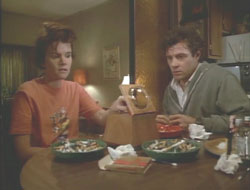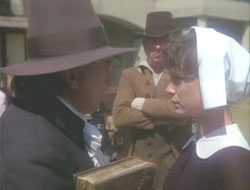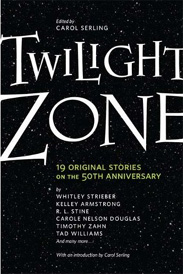Related Research Articles

Harlan Jay Ellison was an American writer, known for his prolific and influential work in New Wave speculative fiction and for his outspoken, combative personality. His published works include more than 1,700 short stories, novellas, screenplays, comic book scripts, teleplays, essays, and a wide range of criticism covering literature, film, television, and print media.

"Button, Button" is the second segment of the 20th episode of the first season of the revival of the television series The Twilight Zone. The segment is based on the 1970 short story of the same name by Richard Matheson; the same short story forms the basis of the 2009 film The Box. It poses the question of whether an ordinary person would be willing to cause a total stranger to die in exchange for $200,000 by simply pushing a button. In a documentary on the making of the movie The Box, Matheson states the inspiration for the story came from his wife, whose college professor had asked a similar question as a way of promoting a class discussion.

"A Message From Charity" is the second segment of the sixth episode of the first season from the television series The Twilight Zone. In this segment, a pair of teenagers–one from 1700, and one from 1985–share a mental link across time.

"Wong's Lost and Found Emporium" is the second segment of the ninth episode of the first season of the television series The Twilight Zone. The segment is based on the short story "Wong's Lost and Found Emporium", by William F. Wu, first published in Amazing Stories in May 1983. It takes place in a mystical shop where ephemeral things such as lost integrity and lost time can be recovered. Its titular lead character, Wong, is portrayed by Brian Tochi.

Twilight Zone: The Movie is a 1983 American sci-fi horror anthology film produced by Steven Spielberg and John Landis. Based on Rod Serling's 1959–1964 television series of the same name, the film features four stories directed by Landis, Spielberg, Joe Dante, and George Miller. Landis' segment is an original story created for the film, while the segments by Spielberg, Dante, and Miller are remakes of episodes from the original series. The film's cast includes Dan Aykroyd, Albert Brooks, Scatman Crothers, John Lithgow, Vic Morrow, and Kathleen Quinlan. Original series cast members Burgess Meredith, Patricia Barry, Peter Brocco, Murray Matheson, Kevin McCarthy, Bill Mumy, and William Schallert also appear in the film, with Meredith assuming Serling's role as narrator.

The Twilight Zone is an American anthology television series which aired from September 27, 1985, to April 15, 1989. It is the first of three revivals of Rod Serling's acclaimed 1959–64 television series, and like the original it featured a variety of speculative fiction, commonly containing characters from a seemingly normal world stumbling into paranormal circumstances. Unlike the original, however, most episodes contained multiple self-contained stories instead of just one. The voice-over narrations were still present, but were not a regular feature as they were in the original series; some episodes had only an opening narration, some had only a closing narration, and some had no narration at all. The multi-segment format liberated the series from the usual time constraints of episodic television, allowing stories ranging in length from 8-minutes to 40-minute mini-movies. The series ran for two seasons on CBS before producing a final season for syndication.

"Living Doll" is the 126th episode of the American television anthology series The Twilight Zone. In this episode, a man suspects that his stepdaughter's new doll is not only sentient, but also intends to kill him.
"Nightcrawlers" is the third and final segment of the fourth episode of the first season of the television series The Twilight Zone. It is adapted from a short story of the same name by Robert R. McCammon, first published in the 1984 collection Masques.
"Treehouse of Horror II" is the seventh episode of the third season of the American animated television series The Simpsons. It first aired on Fox in the United States on October 31, 1991. It is the second annual Treehouse of Horror episode, consisting of three self-contained segments, told as dreams of Lisa, Bart and Homer and is the only Treehouse of Horror episode to date where each segment name is not stated inside the episode. In the first segment, which was inspired by W. W. Jacobs's short story "The Monkey's Paw" and The Twilight Zone episode "A Small Talent for War", Homer buys a Monkey's Paw that has the power to grant wishes, although all the wishes backfire. In the second part, which parodies the Twilight Zone episode "It's a Good Life", Bart is omnipotent, and turns Homer into a jack-in-the-box, resulting in the two spending more time together. In the final segment, Mr. Burns attempts to use Homer's brain to power a giant robotic laborer.
"Crazy as a Soup Sandwich" is the sixty-third episode, and the twenty-eighth episode of the third season (1988–89), of the television series The Twilight Zone. The episode was written by author Harlan Ellison. In the episode, a mob boss contends with a demon. The episode's script was adapted into a segment of the NOW Comics Twilight Zone comic book in the 1990s.
"Jeffty Is Five" is a fantasy short story by American author Harlan Ellison. It was first published in The Magazine of Fantasy & Science Fiction in 1977, then was included in DAW's The 1978 Annual World's Best SF in 1978 and Ellison's short story collection Shatterday two years later. According to Ellison, it was partially inspired by a fragment of conversation that he misheard at a party at the home of actor Walter Koenig: "How is Jeff?" "Jeff is fine. He's always fine," which he perceived as "Jeff is five, he's always five." Ellison based the character of Jeffty on Joshua Andrew Koenig, Walter's son. He declared:
... I had been awed and delighted by Josh Koenig, and I instantly thought of just such a child who was arrested in time at the age of five. Jeffty, in no small measure, is Josh: the sweetness of Josh, the intelligence of Josh, the questioning nature of Josh.
"The Jungle" is episode 77 of the American television anthology series The Twilight Zone, and is the twelfth episode of the third season. It first aired on December 1, 1961. This teleplay was written by Charles Beaumont, based on his short story of the same name, and was directed by recurring director William F. Claxton.
Alan Brennert is an American author, television producer, and screenwriter. Brennert has lived in Southern California since 1973 and completed graduate work in screenwriting at the University of California, Los Angeles.

"Paladin of the Lost Hour" is the second segment of the seventh episode of the first season of the first revival of the television series The Twilight Zone, adapted from a novelette by scriptwriter Harlan Ellison. The story follows the friendship between a Vietnam veteran and an old man entrusted with forestalling the end of the universe. The television episode starred Danny Kaye in one of his final screen appearances.

"Gramma" is the first segment of the eighteenth episode of the first season of the television series The Twilight Zone. This segment, about a boy who is afraid of his grandmother, is based on the short story of the same name by Stephen King, published in the collection Skeleton Crew (1985).

Shatterday is a collection of short stories by American author Harlan Ellison. In the introduction, Ellison states that the stories reflect an underlying theme of fear of human frailty and ugliness. His goal, he writes, is to shock his readers into seeing that this fear unifies all people. Each story has an introduction, ranging from a single sentence to several pages long.
"Time and Teresa Golowitz" is the first segment of the 34th episode, the 10th episode of the second season (1986–87) of the television series The Twilight Zone. It is based on Parke Godwin's "Influencing the Hell Out of Time and Teresa Golowitz", which was published in The Twilight Zone Magazine. In this segment, the Devil gives a Broadway composer a second chance to prevent his high school classmate's suicide.

The Outer Limits is an American television series that was broadcast on ABC from September 16, 1963, to January 16, 1965, at 7:30 PM Eastern Time on Mondays. It is often compared to The Twilight Zone, but with a greater emphasis on science fiction stories. It is an anthology of self-contained episodes, sometimes with plot twists at their ends.
"A Day in Beaumont" is the first segment of the twenty-fourth episode of the first season of the television series The Twilight Zone. In this segment, a couple spends an entire day trying to convince the people of a small town that aliens have landed nearby.

Twilight Zone: 19 Original Stories on the 50th Anniversary is an anthology of short stories written by various authors and edited by Carol Serling, the widow of series creator Rod Serling. Each story was written with themes or styles similar to The Twilight Zone episodes, including a narrated introduction and conclusion. Authors who contributed stories include Twilight Zone veterans Earl Hamner Jr., Alan Brennert, William F. Wu, and Rod Serling. Reviewers listed some of the better stories as being Kelley Armstrong's "A Haunted House of Her Own", Alan Brennert's "Puowaina" and Mike Resnick and Lezli Robyn's "Benchwarmer".
References
- ↑ O'Connor, John J. (September 27, 1985). "TV WEEKEND; PREMIERES OF 'TWILIGHT ZONE' ANB 'MACGYVER'". The New York Times. ISSN 0362-4331 . Retrieved September 26, 2021.
- ↑ Ellison, Harlan (1980). Shatterday (Book Club ed.). Boston: Houghton Mifflin Company. pp. 319–332.
- ↑ Ellison, Harlan (2020). The Twilight Zone: The Complete '80s Series: Audio Commentary - "Shatterday" (DVD). CBS DVD.
- 1 2 3 4 5 Craven, Wes; Brennert, Alan; DeGuere, Philip; May, Bradford (2020). The Twilight Zone: The Complete '80s Series: Audio Commentary - "Shatterday" (DVD). CBS DVD.
- ↑ "Syndication List". Archived from the original on October 22, 2013. Retrieved October 21, 2013.
- ↑ Albarella, Tony. "TZ Season 1 DVD Review". Archived from the original on May 8, 2014. Retrieved October 21, 2013.